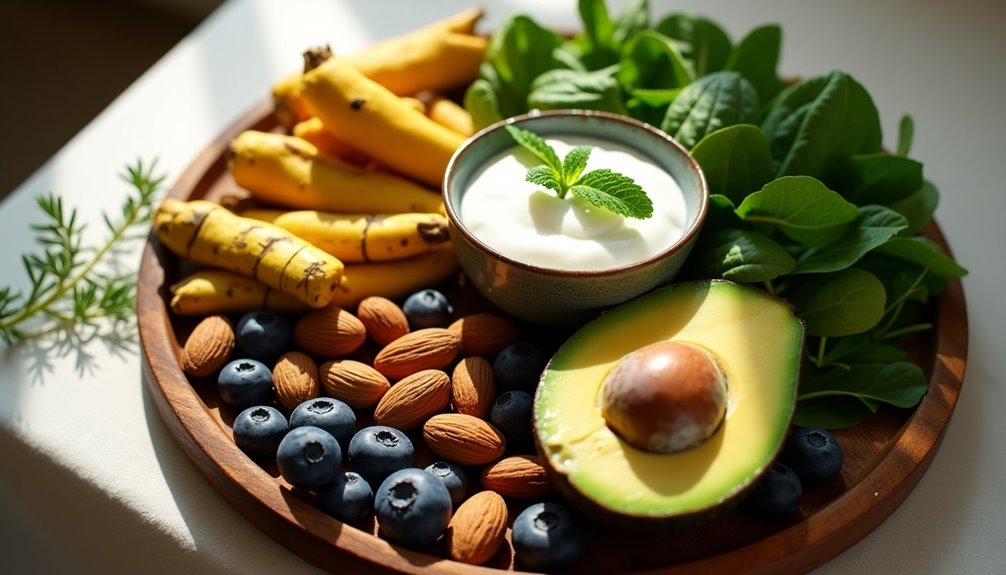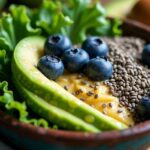To boost your digestion and gut health, consider incorporating these top foods into your diet. Start with yogurt and sauerkraut for probiotics. Add bananas, oats, and chia seeds for fiber, which supports regular bowel movements. Include ginger and garlic for their soothing properties and gut-nourishing prebiotics. Don't forget bone broth; its collagen helps heal the gut lining. Apples also aid in digestion and constipation prevention. By adding these nutrient-packed foods, you'll enhance your overall well-being. Curious about how each can benefit you further? There's a lot more to discover!
Key Takeaways
- Yogurt: A probiotic-rich food that enhances digestion and supports beneficial gut bacteria, ideal for gut health.
- Sauerkraut: Fermented cabbage packed with probiotics, promoting nutrient absorption and a balanced microbiome.
- Oats: High in fiber, oats aid in regular bowel movements and provide prebiotic benefits for gut bacteria.
- Bone Broth: Rich in nutrients and collagen, it helps heal the gut lining and supports overall digestive health.
- Ginger: Contains compounds that soothe digestive issues, reduce bloating, and enhance nutrient absorption.
Yogurt
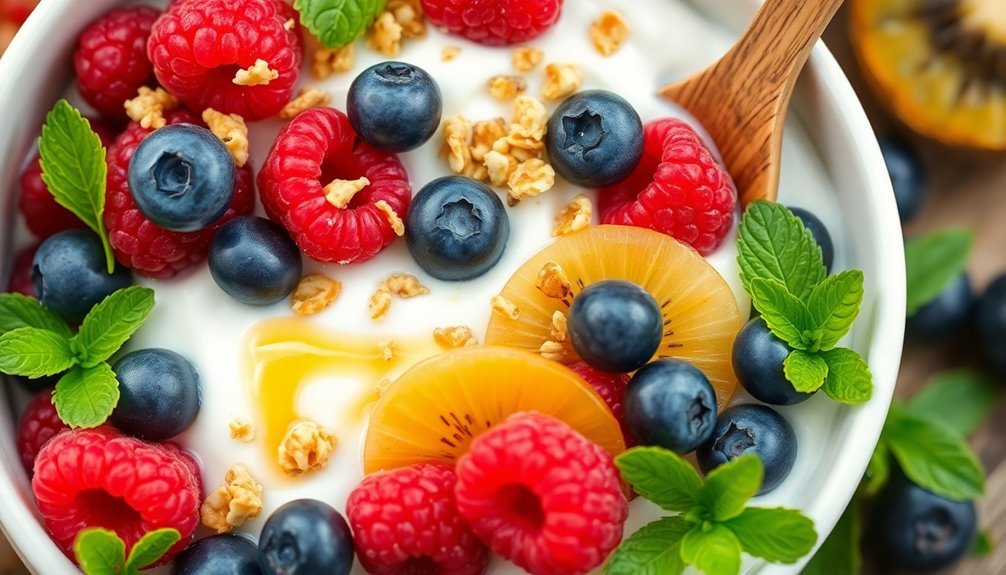
When it comes to promoting better digestion and gut health, yogurt stands out as a delicious and nutritious choice. Packed with probiotics, yogurt is a powerhouse of beneficial bacteria that supports your gut flora. These probiotics help break down food, making nutrients more accessible to your body, and can even alleviate issues like bloating and constipation. Plus, they may enhance your immune system, so you're not just feeling better—you're healthier overall. Additionally, a plant-based diet rich in fruits and vegetables can further contribute to your gut health by providing essential fiber.
If you're lactose intolerant or prefer not to consume dairy, don't worry! There are plenty of dairy alternatives available that also provide probiotic benefits. Many plant-based yogurts, made from almond, coconut, or soy, are fortified with similar beneficial cultures. Just be sure to check the labels, as not all dairy alternatives contain live probiotics.
Incorporating yogurt into your daily routine is easy and versatile. You can enjoy it plain, mix it into smoothies, or use it as a base for salad dressings. Not only does it taste great, but it can also be a satisfying snack that keeps your gut happy.
Sauerkraut

Sauerkraut, a tangy fermented cabbage dish, is another fantastic food for enhancing digestion and promoting gut health. This beloved staple isn't just a condiment; it's a vibrant addition to your meals that packs a serious health punch. The fermentation process transforms raw cabbage into a probiotic powerhouse, loaded with beneficial bacteria that can help balance your gut flora.
One of the key fermentation benefits of sauerkraut is its ability to improve digestion. The live probiotics found in this dish support your gut's natural microbiome, making it easier for your body to break down food and absorb nutrients. If you struggle with bloating or discomfort after meals, incorporating sauerkraut into your diet might provide the relief you need.
Furthermore, sauerkraut is rich in fiber, which aids in regular bowel movements and fosters a healthy digestive system. It's also a great source of vitamins C and K, boosting your immune system while promoting overall well-being. Additionally, the consumption of probiotic-rich foods can help counteract the negative effects of traditional bread, which may contribute to gut inflammation.
The unique flavor of sauerkraut can enhance numerous dishes, from sandwiches to salads, making it easy to include in your daily meals.
Ginger
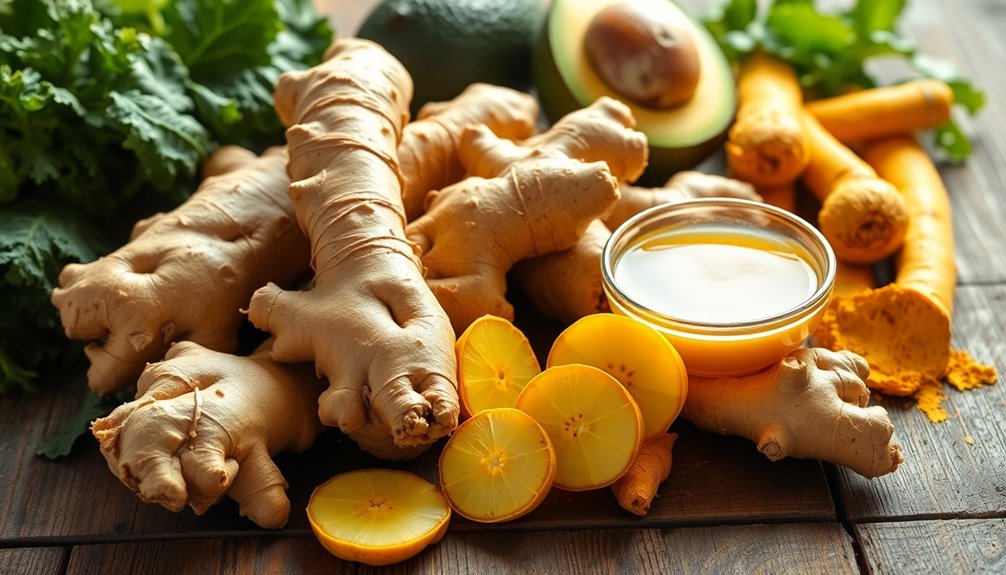
Adding to your repertoire of digestion-enhancing foods, ginger stands out for its remarkable properties in promoting gut health. This powerful root has been used for centuries to alleviate digestive issues, and recent studies support its effectiveness. Ginger contains compounds called gingerols and shogaols, which can help reduce inflammation in the gut and stimulate digestion.
One of the simplest ways to enjoy ginger's benefits is through ginger tea. Brewing a cup not only offers a warm, comforting experience but also aids in soothing an upset stomach, reducing bloating, and relieving nausea.
You can easily make ginger tea by steeping fresh ginger slices in hot water for several minutes, adding a touch of honey or lemon for extra flavor.
If you're looking for a more concentrated form, ginger supplements are a convenient option. They come in various formats, including capsules and extracts, allowing you to easily incorporate ginger into your daily routine. Research suggests that these supplements can effectively support digestive health by promoting bile production and enhancing nutrient absorption.
Incorporating ginger into your diet can be both enjoyable and beneficial. Whether you're sipping on ginger tea or taking ginger supplements, you're making a positive choice for your gut. Understanding natural calorie cycles can also enhance your overall digestive experience.
As you explore the world of digestion-enhancing foods, ginger can be a warm welcome that supports your journey towards better gut health, helping you feel more comfortable and connected to your body.
Bananas
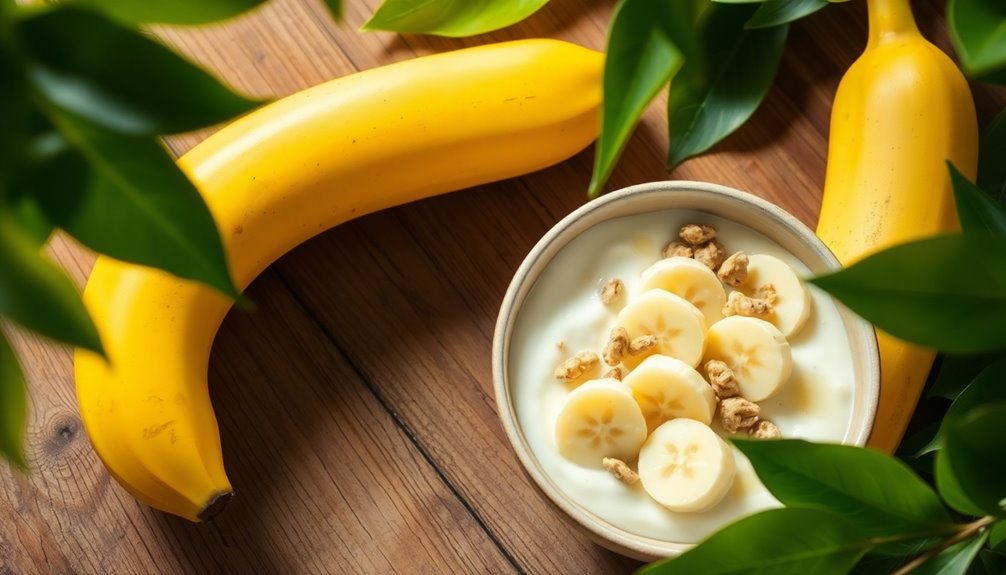
Bananas are a delicious and convenient snack that can greatly benefit your digestive health. Packed with fiber, particularly soluble fiber known as pectin, bananas help regulate your digestive system. This fiber not only aids in digestion but also helps maintain bowel regularity, making it easier for your body to process food and eliminate waste efficiently.
One of the standout digestive benefits of bananas is their ability to soothe an upset stomach. They're gentle on your digestive tract and can help ease symptoms of heartburn and indigestion. Plus, bananas contain prebiotics, which nourish the good bacteria in your gut, promoting overall gut health. Incorporating bananas into your diet can be a great way to benefit from whole food sources of protein, which support overall health and digestion.
If you're looking for easy and tasty ways to incorporate bananas into your diet, consider trying some banana smoothie recipes. Blending bananas with yogurt and a handful of spinach creates a nutritious drink that's not only delicious but also packed with probiotics and vitamins.
You can also mix bananas with other fruits like berries or mango for a invigorating and gut-friendly treat.
Incorporating bananas into your daily routine doesn't have to be a chore. Whether you enjoy them on their own, in smoothies, or as part of a balanced breakfast, you'll be doing your digestion a favor. So next time you're reaching for a snack, remember that a banana might just be the perfect choice for your gut health. Embrace the goodness of bananas and enjoy the lasting benefits they bring to your digestive system!
Oats
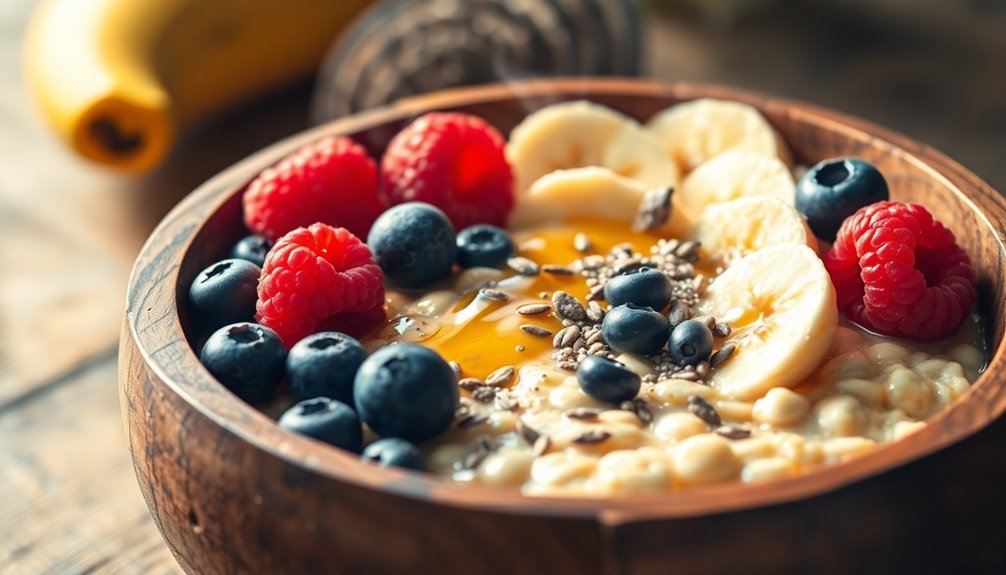
Oats are another fantastic option for promoting better digestion and gut health. When you incorporate oats into your diet, you're not just enjoying a hearty meal; you're also providing your gut the backing it requires.
Oats are rich in soluble fiber, which can boost your fiber intake significantly. This type of fiber helps regulate bowel movements, making digestion smoother and more effective.
Moreover, oats contain prebiotics, which are vital for nourishing the beneficial bacteria in your gut. These friendly microbes play a significant role in breaking down food and maintaining a healthy digestive system. By fueling these bacteria with prebiotics from oats, you're fostering a balanced gut microbiome, which can lead to improved digestion and overall well-being.
You can easily enjoy oats in various ways—whether in a warm bowl of oatmeal, blended into a smoothie, or sprinkled on yogurt. Each serving packs a punch of nutrients that can help you feel fuller longer, reducing the urge to snack on less healthy options throughout the day.
As you consider ways to enhance your gut health, think of oats as a versatile staple in your pantry. Not only do they support your digestion, but they also offer a comforting, satisfying meal that can bring you joy. Additionally, incorporating prevention measures into your diet can further support your overall health. So, the next time you're planning your meals, remember that oats can be a delicious ally in your journey toward better gut health.
Leafy Greens
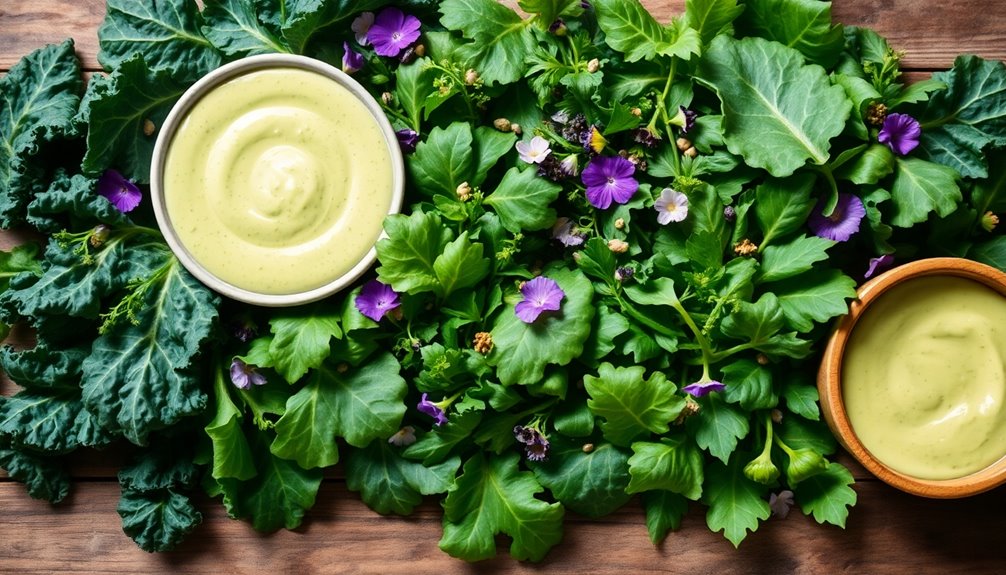
When it comes to enhancing your gut health, leafy greens stand out as a powerhouse of nutrients. These vibrant vegetables, like spinach, kale, and Swiss chard, are packed with vitamins, minerals, and fiber that support your digestive system.
Fiber is essential because it helps to bulk up your stool and encourages regular bowel movements, reducing the risk of constipation. Leafy greens also play a pivotal role in the production of digestive enzymes. These enzymes are necessary for breaking down food and absorbing nutrients effectively.
By including more greens in your diet, you're not just adding volume; you're enhancing your body's ability to digest and utilize the foods you consume. Moreover, leafy greens contribute to gut health by providing prebiotic benefits. They nourish the beneficial bacteria in your gut, promoting a balanced microbiome.
A healthy microbiome is key for overall digestive health, as it aids in nutrient absorption and supports your immune system. This balance allows for better digestion and helps reduce bloating and discomfort. Incorporating leafy greens into your meals is easy and delicious.
Toss them into salads, blend them into smoothies, or sauté them as a side dish. You'll not only enjoy their taste but also reap the rewards of improved digestion and overall well-being. So, if you're looking to boost your gut health, make leafy greens a staple in your diet, and you'll feel the difference in no time!
Bone Broth

Bone broth is a nutrient-dense liquid that can greatly enhance your digestive health. This warm, soothing concoction is packed with minerals and amino acids that support gut healing, making it a fantastic addition to your diet. When you simmer bones for an extended period, you extract beneficial compounds like collagen, which is known for its numerous health benefits.
Collagen benefits extend beyond skin elasticity and may play a significant role in maintaining the integrity of your gut lining. A healthy gut lining is essential for preventing leaky gut syndrome, a condition where undigested food particles and toxins leak into your bloodstream, potentially causing inflammation and other digestive issues. By incorporating bone broth into your meals, you can help support your body's natural defenses, making digestion smoother and more efficient.
Additionally, bone broth is easy to digest, making it perfect for those days when your stomach feels a bit off. You can enjoy it on its own, use it as a base for soups, or incorporate it into your favorite recipes. Its rich flavor not only enhances dishes but also nurtures your gut.
Many people have found that regularly consuming bone broth has led to noticeable improvements in their overall gut health. So, why not give it a try? By making bone broth a staple in your kitchen, you're taking a significant step towards nurturing your digestive system and fostering a lasting sense of wellness.
Apples
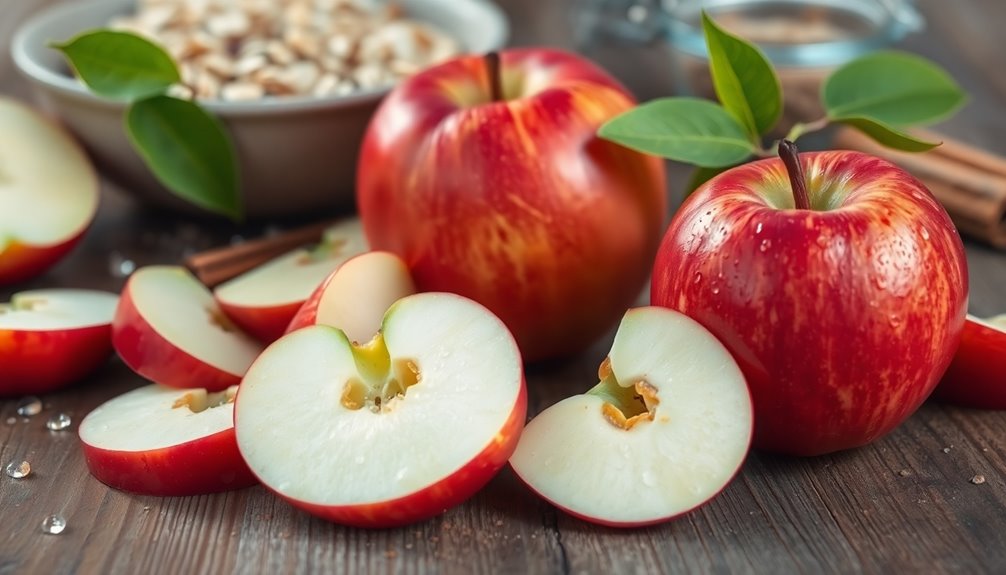
Incorporating apples into your diet can be a delicious way to boost your digestive health. These crisp, juicy fruits aren't only enjoyable but also packed with fiber, particularly pectin, which helps keep your digestive system running smoothly.
With both soluble and insoluble fibers, apples can help prevent constipation while promoting a healthy gut microbiome.
One great way to enjoy apples is through apple cider. This fermented beverage is rich in probiotics, which can enhance gut health by fostering beneficial bacteria. Drinking apple cider can also aid digestion, especially when consumed before meals. Just make sure to choose unfiltered apple cider for maximum health benefits.
If you're looking for a warm treat, try baked apples. This comforting dish retains the fiber and nutrients of the fruit while adding a touch of sweetness. You can easily bake apples with a sprinkle of cinnamon and a drizzle of honey for a wholesome dessert that supports your digestion.
Plus, the warm, fragrant aroma creates a welcoming atmosphere, perfect for sharing with family and friends.
Incorporating apples, whether fresh, as cider, or baked, can greatly enhance your digestive health. Plus, they're versatile and can fit into a variety of meals and snacks. So, grab an apple today, and enjoy all the benefits this simple yet powerful fruit has to offer! Your gut will thank you.
Chia Seeds
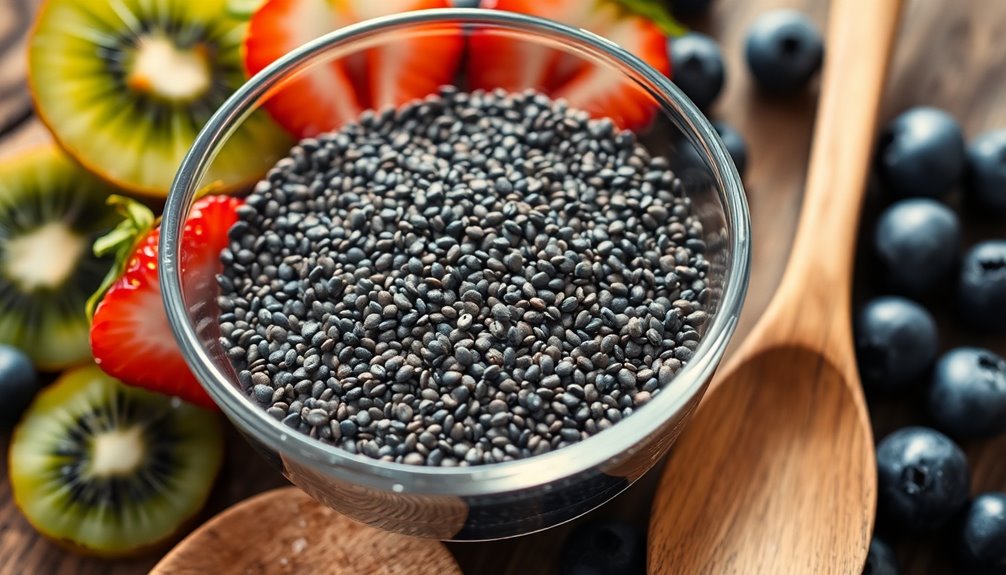
If you're looking to further enhance your digestive health, chia seeds are a fantastic addition to your diet. These tiny seeds pack a powerful punch when it comes to gut health. Rich in fiber, they help keep your digestive system running smoothly. When you consume chia seeds, they absorb water and expand in your stomach, which can promote a feeling of fullness and support regular bowel movements.
You can easily incorporate chia seeds into your meals. A popular and delicious way is by making chia pudding. Simply mix chia seeds with your choice of milk and let it sit overnight. You'll wake up to a creamy, nutrient-dense treat that's perfect for breakfast or as a snack. Another great option is adding chia seeds to your smoothies. They blend seamlessly and provide a boost of fiber and omega-3 fatty acids.
Here's a quick comparison of chia seeds and other common sources of fiber:
| Food Item | Fiber Content (per 100g) |
|---|---|
| Chia Seeds | 34.4g |
| Oats | 10.6g |
| Apples | 2.4g |
| Brown Rice | 3.5g |
| Lentils | 7.9g |
Incorporating chia seeds into your diet can be an easy and effective way to improve your digestive health. With options like chia pudding and smoothies, you'll not only enjoy the health benefits but also discover new and exciting flavors!
Garlic
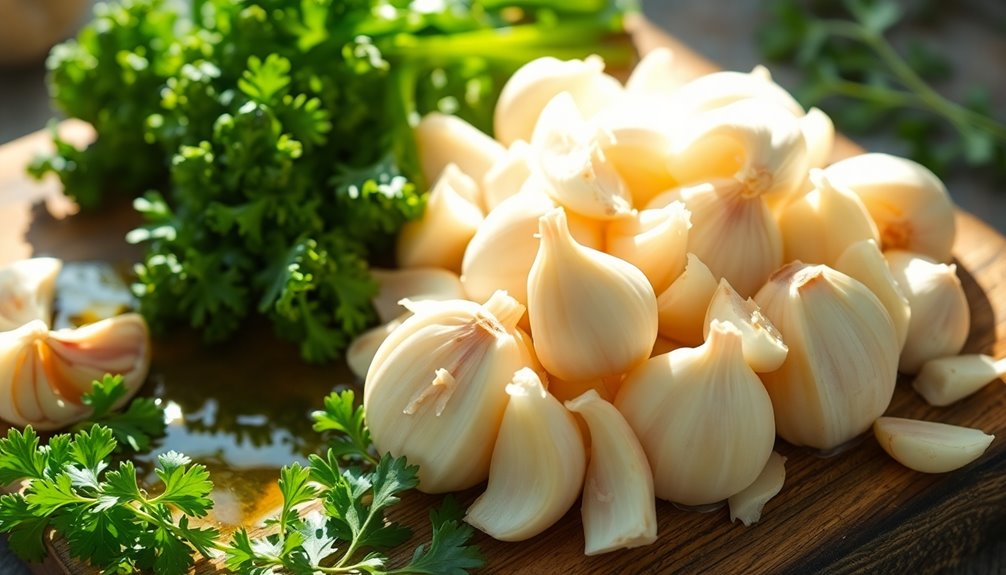
Garlic isn't just a flavorful addition to your meals; it's also a powerful ally for your digestive health. Packed with essential nutrients, garlic offers several gut health properties that can make a significant difference in your overall well-being. When you incorporate garlic into your diet, you tap into its remarkable garlic benefits, which include promoting digestion and enhancing gut flora.
Here are three key benefits of garlic for your digestive health:
- Prebiotic Properties: Garlic acts as a prebiotic, providing nourishment for beneficial gut bacteria. This helps maintain a balanced gut microbiome, essential for efficient digestion.
- Anti-inflammatory Effects: The compounds found in garlic, particularly allicin, have anti-inflammatory properties. This can help soothe the digestive tract and reduce discomfort associated with inflammation.
- Antimicrobial Action: Garlic has natural antimicrobial properties that can help combat harmful pathogens in your gut. This can contribute to a healthier gut environment and better overall digestion.
Frequently Asked Questions
How Often Should I Consume These Foods for Optimal Gut Health?
To optimize gut health, you should focus on meal timing and daily intake. Aim to incorporate gut-friendly foods into your meals regularly—ideally, every day. Spreading these foods across your meals helps maintain a balanced gut microbiome.
Consistency is key; even small daily servings can make a difference. Listen to your body and adjust based on how you feel, ensuring you're supporting your digestion effectively while enjoying a variety of flavors.
Can I Combine These Foods in a Single Meal?
Ever tried a food mash-up like avocado toast topped with kimchi? You can absolutely combine these foods in a single meal! Meal combinations can enhance nutrient absorption, making it easier for your body to reap the benefits.
For example, pairing fiber-rich veggies with fermented foods supports your gut health. So, get creative in the kitchen—these combinations not only taste great but also nourish your gut, helping you feel your best!
Are There Any Side Effects From Eating These Foods?
Yes, there can be side effects from eating certain foods, especially if you have allergies or intolerances. Some foods might cause digestive discomfort or bloating for you, depending on your body's reaction.
It's important to pay attention to how you feel after eating. If you notice any adverse reactions, it's a good idea to consult with a healthcare professional to guarantee your meals support your gut health and overall well-being.
What Is the Best Time of Day to Eat Them?
When's the magic hour for eating? It often comes down to morning vs. evening. Consuming these foods in the morning can jumpstart your digestion, while eating them in the evening can support gut health overnight. Consider pre-meal snacks to prep your system or post-meal choices to aid processing. Ultimately, listen to your body; it knows best when to embrace these foods for peak digestion and health, making you feel your best.
Can These Foods Help With Specific Digestive Disorders?
Yes, specific foods can definitely help with specific digestive disorders like irritable bowel syndrome (IBS) and Crohn's disease. Incorporating fiber-rich foods, probiotics, and anti-inflammatory options can ease symptoms. For IBS, low-FODMAP foods might reduce bloating and discomfort.
If you're dealing with Crohn's disease, nutrient-dense options support overall health and can minimize flare-ups. Always consult a healthcare professional to tailor dietary choices to your unique needs and make sure you're on the right track.
Conclusion
Incorporating these top 10 foods into your diet can greatly enhance your digestion and gut health. By enjoying yogurt, savoring sauerkraut, and embracing ginger, you're feeding your gut the nutrients it craves. Choosing bananas, relishing oats, and sipping bone broth can support a balanced microbiome. Munching on apples, sprinkling chia seeds, and adding garlic can further boost your digestive wellness. Start today, nourish your gut, and feel the difference in your overall health and importance!

